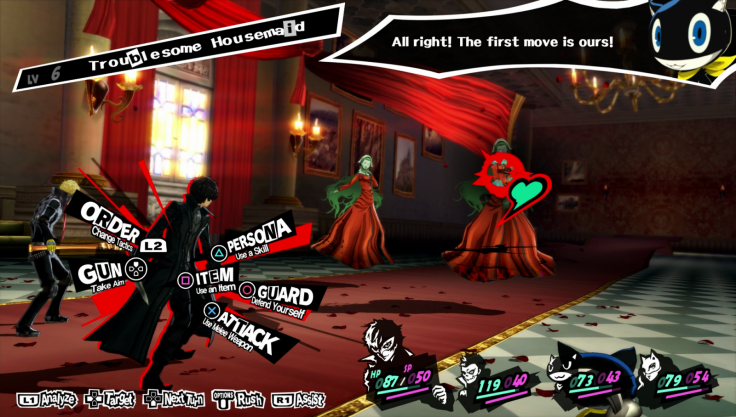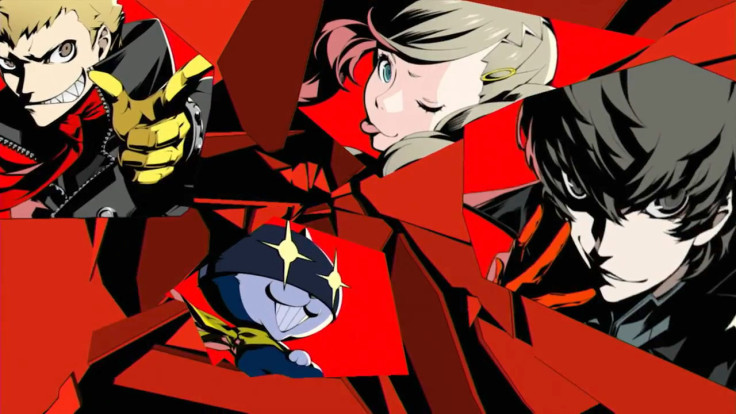Persona 5 review: Atlus' psychedelic PS4 opus is an all-time great RPG
'I lost my heart to a Phantom Thief.'
Persona 5
Platforms: PS4 (tested), PS3
Developer: Atlus
Publisher: Deep Silver
Release Date: Out now
Where To Buy
Amazon / ShopTo / Argos / PlayStation Store
In 2009, the 'father of Mega Man' and then-Capcom bigwig Keiji Inafune proclaimed "Japan is dead" after perusing the games on offer from Japanese developers at that year's Tokyo Game Show. This was the first of many times the outspoken producer would slam the efforts of his countrymen for failing to "innovate" and "diversify", and failing to match what he perceived was a higher level of quality from Western studios.
Evidently, Inafune – who would fall foul of his own hubris following the less-than-stellar reception for ReCore and Mighty Number 9 – must have missed Persona 4, a stunning RPG from a resolutely oddball series that launched in Europe the very same year, and drew further acclaim once it entered its enhanced "Golden" guise on PS Vita in 2012.
Fast forward to 2017 and Atlus' next Shin Megami Tensei series spin-off title has arrived for PS4 (and PS3), starring a new rag-tag clique of high school outcasts, raring to do battle with vicious cognitive demons and demonic mid-term exams.
On the surface, Persona 5 represents the kind of impossible sales pitch to a worldwide audience that Inafune feared: An 80-hour-long RPG adventure that's tightly structured into bite-sized anime-like arcs, packaged in the calendar-format of a life-sim with a smorgasbord of optional daily tasks; a game devout to its series' deviously esoteric design and tonal foibles; an opus of metaphysical themes that cites Jung and Socrates while also directly questioning the player's knowledge of Japanese culture, history and language in pop quizzes.
Not that any of these features are new to the series. Persona 5 may transition from the leafy rural backdrop of Persona 4's Inaba to the flustered backstreets and cramped subways of Tokyo, but its social-sim-meets-dungeon crawler template is still firmly intact.
The beauty of Persona 5 is how it repackages the series' traditions and overwhelming glut of 'things to do' into an intoxicating, dazzling whole, a task easily achieved thanks to its anarchic visual style, where basic menu screen transitions pop off the screen like a teen throwing shapes at an Ayia Napa rave.
The colour red seems to bleed into every frame of Persona 5, splashed over combat animations and dungeon walls like luminous graffiti. During each party member's awakening scene claret violently flows as they rip off their soon-to-be iconic masks, revealing their mythologically-inspired inner form: their "Persona".

The result is a spectacle that pops and crackles throughout, outclassing your average fantasy RPG fare with gusto. Its a style befitting of the vigilante panache of the game's Phantom Thieves of Hearts - a quirky retinue of disgruntled millennials with a rebellious edge.
Replacing the Sherlock Holmes-meets-Scooby Doo escapades of Persona 4's fledgling detectives with renegade criminals is a bold stroke and one that allows for a much sharper, ballsier pace, kicking into gear in a bravura 'in medias res' opening sequence that introduces the key players and sets the "f**k the man" tone perfectly.
Each of the Phantom Thieves has their own backstory, and while some are played for laughs, several delve into the heart of why each has their own distinct reasons for changing the hearts of others. Each character is eventually tied back to a single conceit: the previous generation's corruption, greed and commitment to the status quo must be stopped, by hook or – in this case - by crook.
Relevance to current world events aside (hello, baby boomers), it's a thematic canvas befitting Persona 5's style and formula. Bringing down each of the game's grotesque villains requires breaking into their Palaces – a warped manifestation of their psyche located in an interstitial state between consciousness and subconsciousness dubbed the "Metaverse" – in order to steal a treasured item and force a change of heart.
These multi-floored dungeons range from opulent museums to B-movie sci-fi bases, but instead of the randomly generated level grind-fests of prior Persona titles, here each Palace is a tightly designed obstacle course of deathtraps and demons that plays out like a prolonged, Mission Impossible heist. There are instances of questionable or otherwise arbitrary puzzles, but for the most part they are a joy to blitz through.

Player progress through each Palace is streamlined by light stealth mechanics that allow androgynous avatar, Joker, to hide behind objects for ambush attacks and see collectible hidden jewels with an Arkham-like 'thief vision'. Turn-based combat, meanwhile, is Persona through and through, with elemental strengths and weaknesses, follow-up strikes and all-out attacks, as well as firearms and "Hold Up" negotiations (the latter to snag new Personas in a Pokémon-like collect-a-thon), that return from games across the franchise's 20 years.
Proceedings are equally familiar in the real world where school classes, chores and part-time jobs are as essential as burger challenges and cinema trips (the latter a particular highlight thanks to superb jabs at modern movies). A "Confidant" system replaces "Social Links", but it functions almost identically, offering the chance to build bonds (and potential romance) with party members and would-be Phantom Thieves supporters by having a good ol' natter and helping them overcome their fears, failures and tribulations.
Again, Atlus has streamlined most of the tedium of these sections and the art of navigating its recreation of Tokyo as a whole, improving the quick travel system and adding a smartphone for instant messaging your pals – the latter by way of Atlus' libidinous puzzler, Catherine.
Considering the 'fight the power' mentality of its protagonists, it's a pity that it isn't matched by cast diversity. The more complex characters appear largely toward the latter half of the game, while the sole female presence in the Phantom gang for the first half is almost solely defined by her physical appearance. A minute selection of LBGTQ NPCs also stand out, mostly for all the wrong reasons.
It's a shame, but not a deal breaker, as the stellar writing, voice acting and localisation ensures that party dialogue and Confidant scenes sparkle; every hour of conversation sparks off the screen in comic book-like captions, while the ever-present soundtrack oscillates between brilliantly awful and just plain brilliant concoctions of acid jazz, EDM and guitar riffs.
Persona 5 isn't just a rank and file member of Japan's streak of game of the year contenders in 2017, it's a blistering RPG masterpiece that cements itself among the all-time greats.
Tagging along with the Phantom Thieves of Hearts on their psychedelic capers triggers a contact high of dazzling sights and sounds, with enough thematic depth to match its relentless swagger. It's a game that'll try to steal your own heart, and you'll willingly oblige.
For all the latest video game news follow us on Twitter @IBTGamesUK.
© Copyright IBTimes 2025. All rights reserved.





















